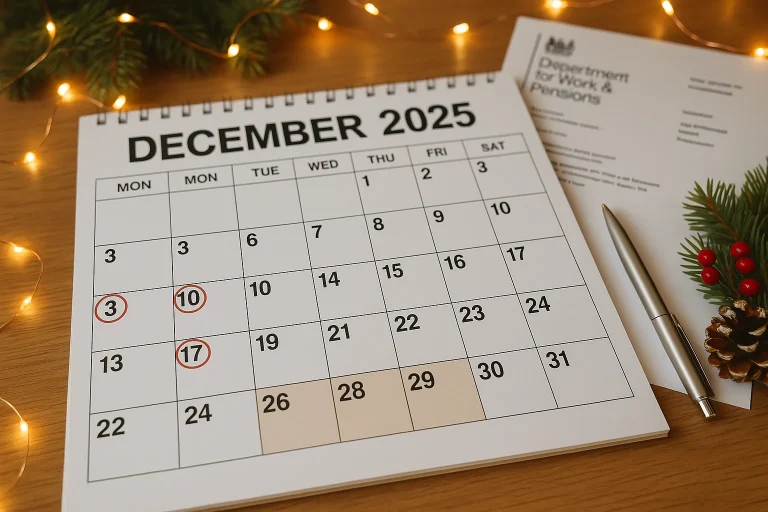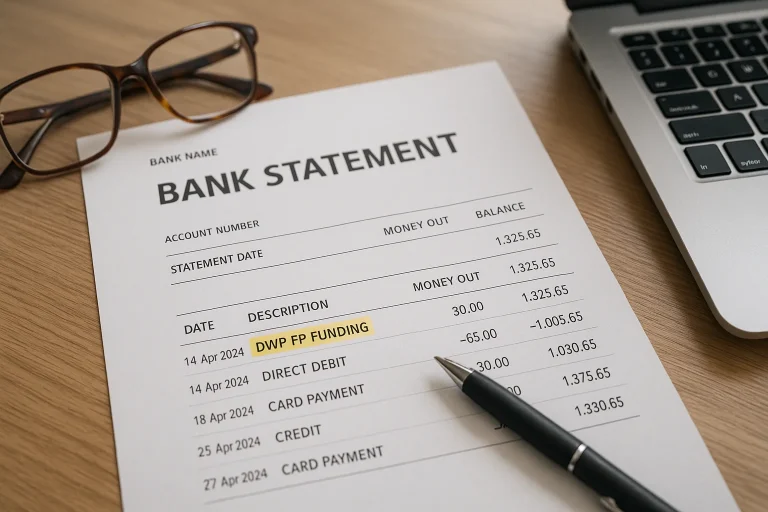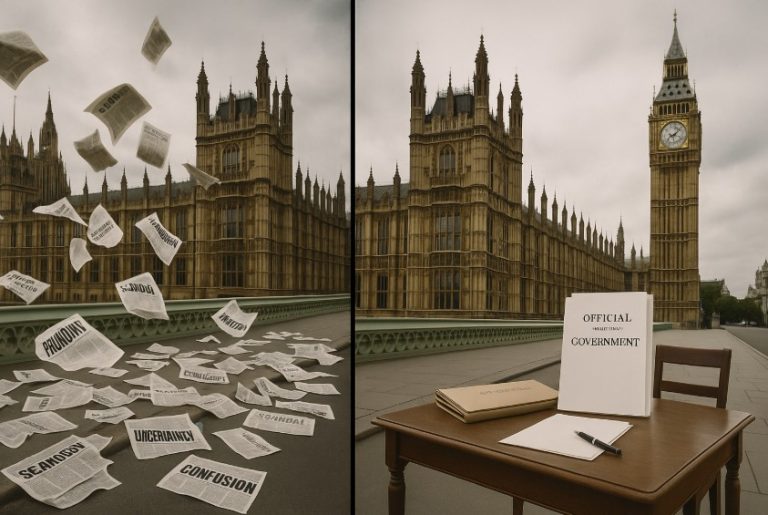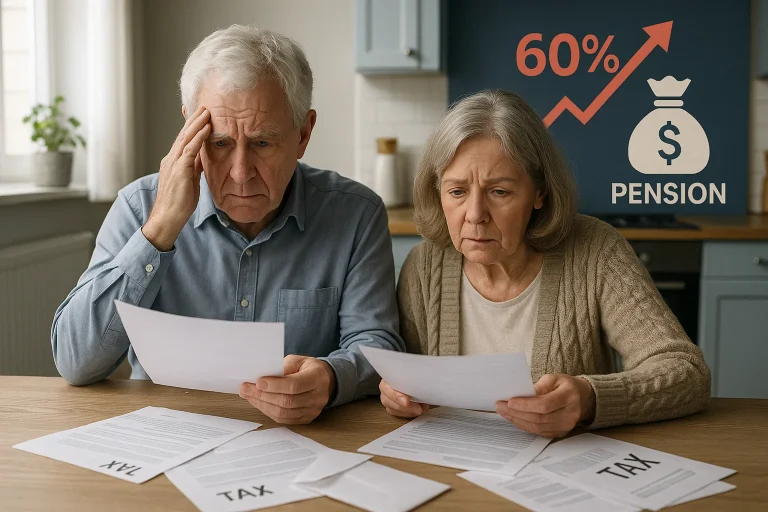Understanding how the Department for Work and Pensions (DWP) manages payments after someone’s death is essential for families dealing with bereavement.
Although commonly misunderstood as “PSCS,” the relevant benefit is the Bereavement Support Payment (BSP), designed to support surviving partners.
Knowing what to expect, how to notify the DWP, and how to handle any overpayments can prevent legal and financial complications.
This guide explains what families need to know when dealing with DWP payments after a loved one’s death.
What Is the DWP PSCS Scheme and How Does It Work?
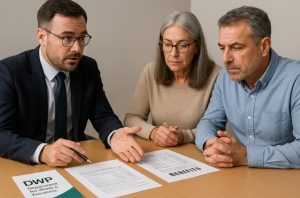
There is no official Department for Work and Pensions (DWP) scheme titled “PSCS”. The correct term for post-death financial support from the DWP is the Bereavement Support Payment (BSP).
This benefit is offered to individuals who have lost a spouse, civil partner, or long-term partner.
It was introduced to replace older benefits such as the Bereavement Payment and Widowed Parent’s Allowance for deaths occurring on or after 6 April 2017.
The BSP is a tax-free benefit designed to help with the immediate financial impact following a bereavement. It is not based on income or savings and does not affect most other benefits for the first year.
There are two parts to the Bereavement Support Payment:
- A one-off lump sum payment
- Monthly payments for up to 18 months
The total amount received depends on when the claim is made and the recipient’s circumstances, such as whether they have dependent children.
What Happens to PSCS Payments After Someone Dies?
There is often confusion surrounding what happens to government benefit payments following a person’s death. While the term “PSCS” is sometimes used informally, there is no such payment under that name from the Department for Work and Pensions (DWP).
The relevant benefit in this context is the Bereavement Support Payment (BSP), which is not issued to the deceased but is instead available to the surviving partner.
When someone dies, all benefits paid directly to them by the DWP, including State Pension, Attendance Allowance, or Disability Living Allowance, should stop immediately.
If the DWP is not notified promptly, payments may continue unintentionally. These are classified as overpayments, and the DWP is legally entitled to recover them.
Bereavement Support Payment is not subject to the same issue, as it is paid only after a valid claim has been made by the surviving partner. Therefore, it does not continue after the death of the individual receiving it because it is not paid to them in the first place.
For other benefit types, the process is different. The DWP uses the date of death to calculate whether any benefits were incorrectly paid after death. If such payments are made, the DWP may:
- Request repayment from the deceased’s bank account if the funds are still available
- Contact the executor or administrator of the estate to reclaim the overpayment
- Write off small or unrecoverable amounts if recovery is deemed impractical
In practice, the DWP relies on relatives or representatives of the deceased to notify them quickly. Without timely communication, payments may continue, which can lead to significant financial and legal consequences for the estate or those handling the deceased’s affairs.
Families are advised not to use any benefit funds received after the death until clarification is obtained from the DWP, as doing so could result in legal obligations to repay the money. Stopping these payments early can prevent such complications.
Who Is Responsible for Notifying the DWP After a Death?

Notifying the Department for Work and Pensions (DWP) after someone has died is a crucial step in managing their financial affairs. Failure to report a death promptly can result in continued benefit payments, potential overpayments, and complications for the deceased’s estate.
The responsibility to inform the DWP typically lies with the next of kin, the executor of the will, or a close family member or friend who is managing the deceased’s personal and financial matters. In some cases, a solicitor or funeral director may also help facilitate the process, but the legal obligation ultimately rests with those handling the estate.
The government provides a helpful service known as Tell Us Once, which allows you to report a death to multiple government departments at the same time. This includes:
- DWP
- HM Revenue and Customs (HMRC)
- The Passport Office
- DVLA
- Local council services
Using the Tell Us Once service ensures that all relevant departments are informed, which reduces the risk of overpayments or administrative issues. The service can be accessed through the local registrar when the death is officially registered.
Alternatively, you can notify the DWP directly through one of the following methods:
- Call the Bereavement Service helpline on 0800 151 2012
- Apply online via the GOV.UK website
- Send a written notice by post if required
When contacting the DWP, you will typically need to provide:
- The deceased person’s full name, date of birth, and date of death
- Their National Insurance number
- Details of any benefits they were receiving
- Your contact information and relationship to the deceased
If you are also claiming the Bereavement Support Payment, the same helpline or online service can be used to initiate your claim. It is advisable to do this within 3 months of the death to receive the full entitlement, although claims can be made up to 21 months later.
Early notification not only helps prevent benefit overpayments but also allows the surviving partner or family to access support and information more quickly. Executors should also retain proof of communication with the DWP as part of the estate administration process, in case it is needed for future reference or legal verification.
Can the DWP Recover PSCS Payments Made After Death?
While Bereavement Support Payment itself is not made to the deceased, other benefit types paid in the period after someone’s death may need to be recovered. These include:
- State Pension
- Attendance Allowance
- Disability Living Allowance
- Carer’s Allowance
If the DWP is not notified quickly, payments may continue and be classified as overpayments. These are recoverable by law. The DWP has the right to:
- Request repayment from the estate
- Issue a notice of overpayment
- Work with banks to recover funds not yet withdrawn
The recovery process usually begins with a written notice explaining the amount overpaid and the reason. If the funds are still available in the deceased’s bank account, the DWP may request that they be returned or reverse the transaction.
In most cases, recovery is pursued through the executor or administrator of the estate. If no estate exists, the DWP may consider the matter closed, particularly if the debt is small or recovery is not financially viable.
How Does the DWP Recover Overpaid Benefits from an Estate?
The DWP’s process for recovering overpayments from an estate involves multiple steps. Recovery is based on the principle that money wrongly paid after death belongs to the public purse and must be returned.
The typical steps are:
- Identification of the overpayment
- Issuance of a formal notice to the executor
- Request for full repayment from the estate
- Negotiation or alternative arrangements if the estate cannot cover the full amount
The executor is not personally liable for the debt, but they must settle it from the estate’s funds before distributing assets to beneficiaries.
Here is a table summarising how recovery works:
| Step | Executor’s Responsibility |
| Receive overpayment notice | Acknowledge and verify details |
| Assess estate funds | Determine if sufficient to repay |
| Contact DWP | Request clarification or repayment terms |
| Settle debt | Repay from estate before distribution |
| Provide proof | Submit statements or documents if requested |
If the estate is insolvent or there are insufficient assets, the DWP may choose not to pursue the full amount.
What Are the Rights of Families Regarding PSCS Overpayments?

Families have several legal rights when dealing with overpayments claimed by the DWP. These rights ensure that overpayment demands can be reviewed and, if necessary, contested.
Key rights include:
- The right to a full explanation of the overpayment
- The right to dispute the amount or validity
- The right to request a mandatory reconsideration
- The right to appeal to an independent tribunal
In some cases, the DWP may waive repayment if recovering the overpayment would cause serious financial hardship. Families can submit a hardship claim and provide supporting documents such as income statements and bills.
It is recommended to:
- Respond to DWP letters promptly
- Keep records of all communications
- Seek independent advice from Citizens Advice or a solicitor
What Support Is Available for Families Dealing with DWP Repayments?
Families often find it difficult to deal with financial matters during bereavement. Fortunately, several support services are available.
Support options include:
- Citizens Advice: Free guidance on dealing with benefits, overpayments, and executor duties
- StepChange Debt Charity: Help with budgeting and managing repayment plans
- MoneyHelper: Government-backed financial guidance on bereavement
- Solicitors: Professional advice for managing complex estates or legal challenges
In many cases, support services can help communicate with the DWP, particularly if the family is feeling overwhelmed.
Here’s a table showing where to get help:
| Organisation | Type of Support |
| Citizens Advice | Benefit advice, legal guidance |
| StepChange | Debt support, payment plans |
| MoneyHelper | Financial guidance on bereavement |
| Local Council | May offer bereavement officers |
| Law firms | Estate management and legal advice |
These services can often assist in resolving overpayment disputes or negotiating repayment terms with the DWP.
How Can Families Avoid DWP Overpayment Issues After Death?
Avoiding overpayment issues starts with prompt and accurate communication. The DWP relies on timely information to stop payments and assess any entitlements such as Bereavement Support Payment.
Steps to reduce risk:
- Use the Tell Us Once service immediately after registering the death
- Avoid using any benefits deposited after the death
- Keep a record of the deceased’s benefits and payments
- Report the death directly to the DWP if in doubt
Where Bereavement Support Payment is involved, ensure the claim is made within 21 months of the death, but ideally within 3 months to receive the full entitlement.
What you will need to claim BSP:
- Your National Insurance number
- Your partner’s National Insurance number
- Date of death
- Bank or building society account details
- Marriage or civil partnership certificate (if applicable)
Claims can be made by calling 0800 151 2012, online at GOV.UK, or by post using the downloadable form.
What Is the Role of the Executor in Handling DWP PSCS Payments?

The executor or administrator of a deceased person’s estate is responsible for handling all financial matters, including any communications with the DWP. This includes:
- Informing the DWP of the death
- Responding to overpayment notices
- Paying debts from estate assets
- Keeping records of all payments and correspondence
Executors are not liable for the DWP’s overpayment if the estate has no funds, but they must provide accurate financial details to support this claim. In larger or complex estates, it may be necessary to involve a solicitor to ensure that all legal duties are fulfilled correctly.
If the executor fails to respond to DWP correspondence or distributes the estate before settling debts, they may become personally liable for any outstanding amounts.
Conclusion
Navigating the complexities of DWP payments after a loved one’s death can be emotionally and administratively challenging. Although there is no official DWP scheme known as “PSCS”, the Bereavement Support Payment provides much-needed financial assistance for surviving partners.
Families should be aware of their rights, responsibilities, and available support. Promptly notifying the DWP, understanding overpayment rules, and knowing how to claim the correct benefits can prevent legal issues and help ease the burden during a difficult time.
Frequently Asked Questions
What should I do if I receive a DWP payment after my relative’s death?
Contact the DWP immediately and do not use the money. Overpayments may need to be repaid, and informing the DWP quickly helps resolve the issue smoothly.
How long does the DWP take to contact families after someone dies?
The DWP usually responds within a few weeks if notified through the Tell Us Once service. Direct notification by phone or online may speed up the process.
Will the DWP always ask for overpaid benefits to be returned?
Yes, in most cases. However, if there’s no estate or funds available, and pursuing repayment is impractical, the DWP may decide not to recover the debt.
What if there’s no money in the estate to repay the DWP?
If the estate lacks funds, the DWP may write off the debt. Executors should communicate this clearly and provide financial documentation if requested.
Can I appeal a DWP overpayment request after death?
Yes. You can request a mandatory reconsideration or take the matter to a tribunal if you believe the overpayment notice is incorrect or unfair.
How does the DWP calculate how much is owed back?
The DWP reviews payments made after the date of death and determines whether they were issued in error. A notice with a detailed breakdown is usually sent.
Does the DWP contact banks directly after a death?
In some cases, the DWP may work with banks to retrieve overpaid funds. However, they usually attempt to contact the estate or executor first.

